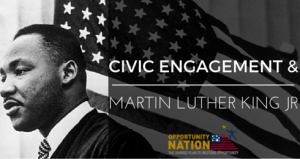Martin Luther King Jr. and Civic Engagement
 •
•
In his famous “I’ve Been to the Mountaintop” speech, Dr. Martin Luther King Jr. referred to seeing the “promised land,” a world where everyone, no matter their skin color or zip code, had equal access to opportunity. While Dr. King tragically was unable to see the full impact, in law and society, of the changes he had championed, his dedication remains a powerful example of how civic engagement can transform neighborhoods, communities and the perspective of an entire nation.
Nevertheless, nearly 48 years after the death of Dr. King, there is still more work to be done to improve the opportunity landscape. Today in the United States, 5.5 million young adults ages 16 to 24 are not working or in school and the rate of youth disconnection is higher than pre-recession levels. While the rest of the US is recovering from the Great Recession, far too many young Americans have been left behind.
These numbers are worse for disconnected young adults of color. According to Measure of America’s report, Zeroing in on Place and Race: Youth Disconnection in America’s Cities, in some major American cities, at least one in four black youth and one in five Latino youth are disconnected. These numbers are not something Dr. King would be proud of, but one solution is part of his legacy: civic engagement.
While it may be easy to pass off civic engagement as merely a feel-good activity, data suggests that volunteering is an important strategy for combating youth disconnection. Our report, Connecting Youth and Strengthening Communities: The Data Behind Civic Engagement and Economic Opportunity, shows that the chances that a young adult is disconnected drops in half if he or she volunteers.
For example, the likelihood that a black youth is disconnected falls from 27.7 percent to 17.8 percent if he or she volunteers. For Hispanic, youth, their likelihood falls from 20.9 percent to 13 percent. These findings indicate that volunteering may serve as a bridge to deeper civic participation and economic well-being for young adults.
This is why the expansion of volunteering opportunities for low-income youth is so critical. We must support the expansion of cross-sector initiatives that promote volunteering— and equal access to such opportunities—among all youth, particularly low-income young adults who can most benefit from the skill-building that these activities offer. These opportunities must be structured in an accessible way so that these teens and young adults, many of whom face time constraints and logistical challenges, such as difficulty finding transportation, can access them.
We also urge employers to lead the charge in creating volunteer programs and civic projects as a way for professionals to engage and mentor disconnected youth. These investments will help youth build the confidence and skills they’ll need to be successful in the workforce, and will also support a higher level of opportunity in their communities.
Dr. King once said, “Everyone can be great, because everyone can serve.” For the 5.5 million disconnected youth in America the first step we can take to help them climb the ladder of success is providing them the opportunity to serve their communities.









